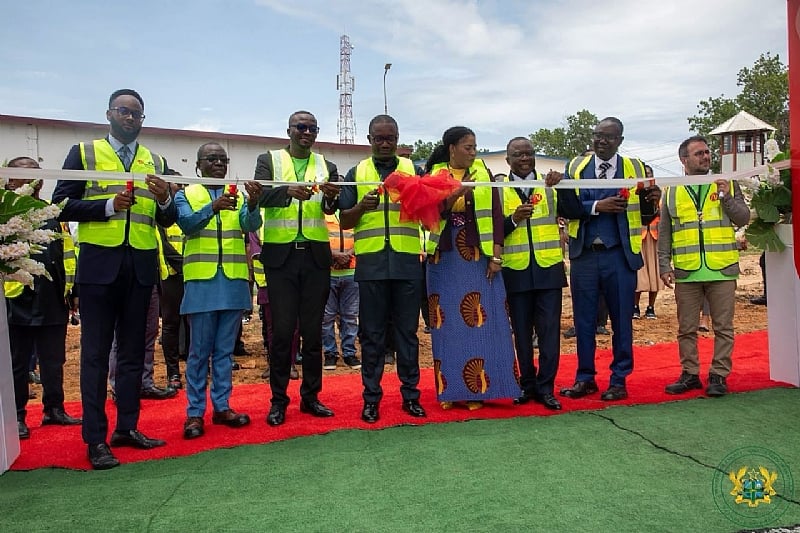Ghana’s Green Energy Leap: Nexans Kabelmetal’s Solar Plant Inauguration and National Renewable Energy Strategy
Ghana has taken a significant step towards its renewable energy goals with the commissioning of a 532-kilowatt peak (kWp) solar photovoltaic (PV) plant by Nexans Kabelmetal Ghana Limited. This project, inaugurated by the Minister for Energy and Green Transition, John Abdulai Jinapor, on May 21, 2025, signifies a crucial milestone in the country’s transition to a cleaner energy future. The Minister lauded Nexans Kabelmetal’s investment as a testament to the private sector’s growing involvement in Ghana’s green energy revolution, highlighting the plant as a symbol of the nation’s commitment to diversifying its energy sources and building a more resilient energy sector. This move aligns with the government’s strategic vision to reduce dependence on fossil fuels and embrace sustainable, inclusive, and scalable renewable energy solutions.
The government has implemented various policy initiatives and reforms to accelerate the growth of renewable energy infrastructure. The establishment of the Renewable Energy Authority and the Renewable Energy Investment and Green Transition Fund demonstrate the government’s commitment to fostering a conducive environment for renewable energy investments. The recently launched National Net-Metering Tariff Guideline further empowers solar energy producers by enabling them to sell excess electricity back to the national grid, thereby encouraging both energy efficiency and increased investment in green energy solutions. This mechanism incentivizes the adoption of solar energy and fosters a dynamic market for renewable energy production.
Looking ahead, the government plans to implement several key measures to further accelerate the adoption of renewable energy. The nationwide rollout of smart reversible meters by the end of 2025 will enable homes and businesses to seamlessly integrate solar energy into the national grid, facilitating a two-way flow of electricity and optimizing energy utilization. This initiative will not only enhance energy efficiency but also contribute significantly to decarbonizing Ghana’s energy supply. The upcoming Scaling-Up Renewable Energy Programme (SREP), set to launch on May 30, 2025, in Kete Krachi, will add 100 megawatts of renewable power to the national grid through a combination of mini-grids, rooftop solar installations, and solar home systems, expanding access to clean energy for businesses, public institutions, and off-grid communities.
The SREP’s second phase, currently in the planning stages, will extend clean electricity access to over 150 islands in the Afram Plains, further demonstrating the government’s commitment to achieving widespread electrification. These initiatives are crucial for attaining the government’s ambitious target of 99.8% national electricity access by 2030. The government recognizes the transformative potential of rooftop solar systems in boosting the competitiveness of Ghanaian industries by reducing operational costs and aligning with the global shift toward sustainable manufacturing practices. This focus on renewable energy not only contributes to environmental sustainability but also enhances the economic viability of local businesses.
The Nexans Kabelmetal solar plant serves as a powerful representation of Ghana’s collective determination to build a greener and more sustainable economy driven by innovation and public-private partnerships. The Minister’s commendation of Nexans Kabelmetal’s foresight and commitment to sustainable growth underscores the importance of private sector involvement in driving the transition to a cleaner energy future. This partnership approach is essential for accelerating the adoption of renewable energy technologies and achieving national sustainability goals.
The government’s unwavering support for local industry and its pledge to implement policies that empower Ghanaian businesses in the renewable energy sector are crucial for fostering a thriving green economy. By creating an enabling environment for private sector participation and investing in critical infrastructure, Ghana is laying a strong foundation for a sustainable future powered by clean energy. The commissioning of the Nexans Kabelmetal solar plant represents a significant step forward in this journey, demonstrating the nation’s commitment to a greener, more resilient, and prosperous future. The government’s comprehensive strategy, combining policy reforms, targeted initiatives, and public-private partnerships, positions Ghana as a leader in the African renewable energy landscape.


